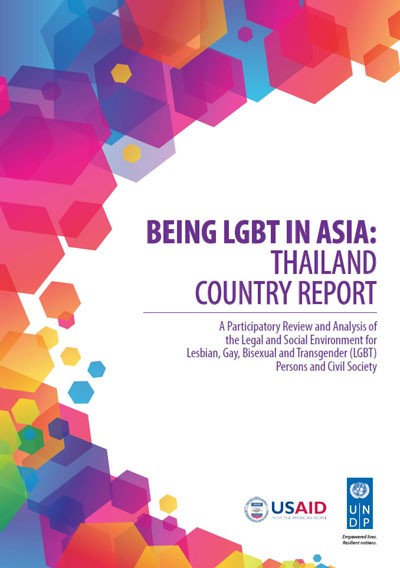Home » News & Information » Press Releases » Thailand’s LGBT Communities Continue to Face Social Stigma: Comprehensive US-UN LGBT Report

Being LGBT in Asia: Thailand Report
USAID and UNDP
For Immediate Release
Tuesday, September 16, 2014
BANGKOK, September 16, 2014 – Thailand’s first report assessing the challenges of lesbian, gay, bisexual and transgender (LGBT) communities in the country concludes that LGBT people report they face widespread social stigma and are afforded few job opportunities.
Released today, the “Being LGBT in Asia” Thailand Country Report – a joint analysis by the U.S. Agency for International Development (USAID) and the United Nations Development Programme (UNDP) – highlights a contradiction between Thailand’s public face of tolerance toward LGBT communities and the reality of discrimination toward them. The report found that while the tourism authority actively promotes Thailand as a gay tourist destination, acceptance of non-traditional sexualities in Thai society is still perceived to be low.
"There's no room for stigma and discrimination in today's world," said U.S. Ambassador Kristie A. Kenney. "Truly sustainable development requires everyone's contribution and participation, including the LGBT community."
The landmark report is the first comprehensive review and analysis of Thailand’s legal and social environment encompassing in-depth research on LGBT issues in Thailand.
"Thai LGBT activists and organizations have been working very hard to ensure that people of different gender identities and sexual orientations can live their lives openly and be supported by the Thai legal frameworks,” said Midnight Poonkasetwattana, Executive Director of the Asia-Pacific Coalition on Male Sexual Health (APCOM), a Bangkok-based regional nongovernmental organization. “I hope that recommendations from this report will be implemented and look forward to the day that Thailand becomes the leader in ASEAN for LGBT rights."
According to the report, there is limited education about LGBT issues in schools and LGBT people live in a society where there is strong pressure to be a “good citizen” and put family concerns or interests before their own. This is compounded by the notion that one’s sexuality or gender must not go against accepted norms and should not bring shame to oneself or one’s family. Many of Thailand’s LGBT people remain in the closet, fearful of social stigma and discrimination.
"Thailand is one of the few countries in the Asia-Pacific region where the LGBT community has high visibility. But visibility does not always translate to equality.
The United Nations in Thailand is working with the Government, civil society, and development partners to ensure that LGBT people have equal rights and are free from any form of discrimination,” said UN Resident Coordinator and UNDP Resident Representative for Thailand, Luc Stevens.
The report also highlights that Thai transgender individuals cannot change their gender on identity papers, and male-to-female transgender people are often forced into military service. Thailand’s LGBT people face workplace discrimination, including being denied promotions or fired from their jobs after disclosing their sexual orientation or gender identity. Transgender people are often limited in workplace options. School bullying against LGBT people is very common. While the country’s constitution prohibits discrimination against citizens on any grounds, there are no laws that recognize LGBT relationships or parenthood and laws on marriage apply only to heterosexual couples.
The Thailand country report was produced as part of the ‘Being LGBT in Asia” initiative launched on Human Rights Day in December 2012. It seeks to promote understanding of the fundamental challenges faced by LGBT people and to document the progress being made in anti-discrimination efforts. It also makes a series of recommendations that are designed to complement the findings in different topical areas.
‘Being LGBT in Asia” is a regional collaboration between USAID, UNDP and the LGBT civil society. Other UN agencies such as the Office of the United Nations High Commissioner for Human Rights (OHCHR) and the United Nations Children’s Fund (UNICEF) and USAID country missions have also partnered with the initiative in individual countries. It is currently being implemented in Cambodia, China, Indonesia, Mongolia, Nepal, the Philippines and Vietnam.
Download the report: http://www.usaid.gov/documents/1861/being-lgbt-asia-thailand-country-report
Find out more about the ‘Being LGBT in Asia’ program here: http://www.usaid.gov/documents/1861/being-lgbt-asia







Comment
Make a general inquiry or suggest an improvement.